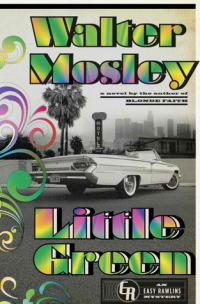Total Chaos by Jean-Claude Izzo
 Friday, May 17, 2013 at 10:22PM
Friday, May 17, 2013 at 10:22PM Published in French in 1995; published in translation by Europa Editions on May 7, 2013
First published in 1995, Total Chaos is French literary noir. Three friends from the melting pot of Marseilles (whose parents spoke Italian or Spanish at home) bond in their youth over their outsider status and a shared love of poetry and old books. That, and their shared love of the beautiful Lole. The three friends once participated in a series of armed robberies, but their adult lives have gone in different directions. Fabio Montale became a cop. Manu is dead. Pierre Ugolini, having spent some time drifting, returns to Marseilles to avenge Manu's killing. It is a question of honor, and honor is all that matters in Marseilles. It doesn't end well for Ugolini, and that's where the story begins.
Montale's job is to preempt rioting in a neighborhood where the French regard everyone who isn't of French ancestry as a dirty Arab. When Leila Mouloud disappears -- an Arab student upon whom Montale has something more than a crush -- Montale assures her father that he will find her. At the same time, Montale is determined to understand what happened to Manu. Therein lies the plot -- such as it is.
Montale spends quite a bit of time revisiting the past -- too much time, as the story is often slow to move forward. Much of the novel seems directionless. A fair amount of the novel -- apart from Montale showing off his exquisite taste in food, alcohol, and music -- consists of Montale's internal monologue. Some of it (particularly the woeful condition of immigrants) is interesting, but his redundant thoughts did not always hold my attention. I expect a certain amount of existential angst in a noir protagonist, but Montale just won't shut up about his relentlessly downbeat view of the world. There are only so many times I can read things like "We were all like insects caught in a spider's web. We struggled, but the spider would eat us in the end" before I want to slit my throat. Or maybe Montale's, to put him out of his misery.
Montale is a classic noir character, the alienated tough guy with a soft heart. He doesn't fit in with the police -- he too frequently identifies with the outlaws, rooting for the underdog -- but he cannot abide the pain caused by crime. He's surrounded by corruption and despair (from which, conveniently enough, frequent sexual encounters provide his only respite). He easily falls in love but never holds onto it, perhaps because he doesn't really want it. He tells us, more than once, that he loves women too much. Eventually, his "I am so passionate, I love every woman I take to bed, including the prostitutes; I cook wonderful meals for them with fennel and garlic but I will never be happy" attitude starts to wear thin. Maybe it's a French thing. And maybe observations like this are a French thing -- "There in front of me was every man's dream: a mother, a sister, and a whore!" -- but even by noir standards, that's a little too cute for my taste.
There are things about Total Chaos I admired. Jean-Claude Izzo writes short, punchy sentences that are well suited to the story he tells. He captures the atmosphere of Marseilles -- its music, ethnic restaurants, and commuter trains full of tough-acting kids -- in vivid terms (the city is "an ancient tragedy in which the hero is death"). While there is the skeleton of a good story here, it is given too little flesh. I like the way the twin mysteries are eventually resolved, but the story is too often dull, and noir should never be dull. Montale does no detective work to speak of, opting to drift through the novel, making existential comments upon the seedy events he observes ("life didn't matter. The only thing that mattered was death"). Not quite all: sex and cognac and sex and well-prepared food and sex also matter to Montale. It's unfortunate that he's too awash in self-absorbed despair to recognize the pleasure in the things that obviously give him so much pleasure. Total Chaos is the first novel of a trilogy, but it failed to inspire me to read the other two. I'm not sure I would survive the experience.
NOT RECOMMENDED



